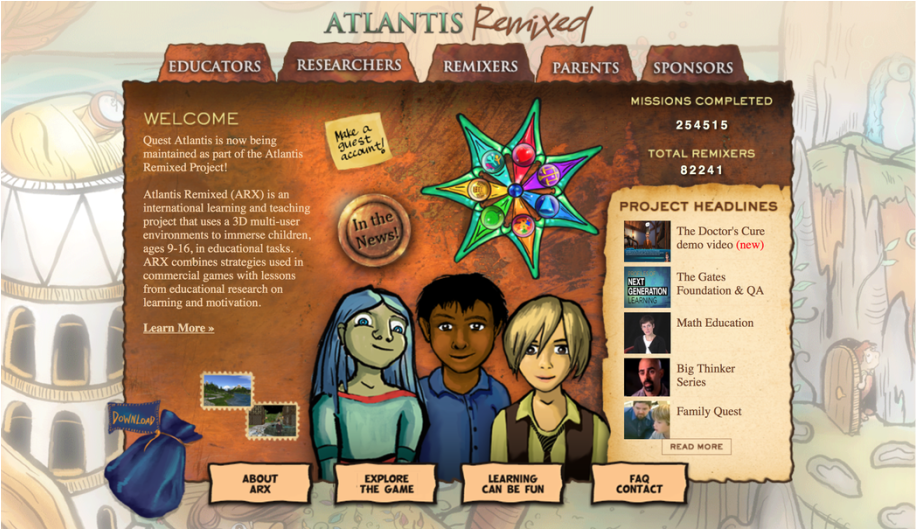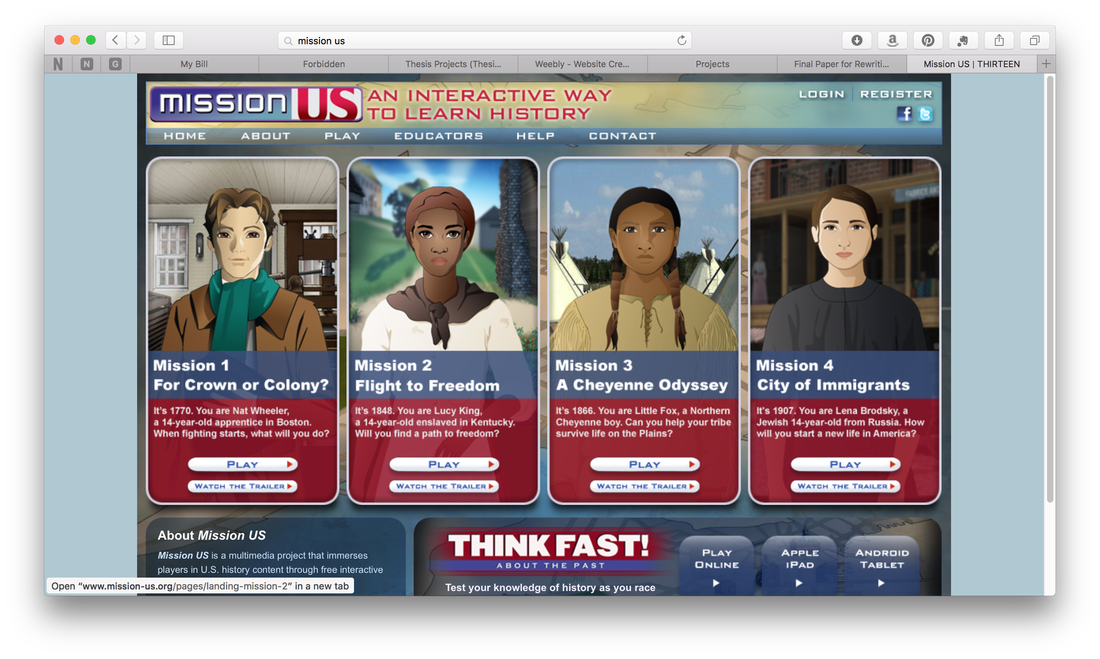|
11/5/2015 0 Comments Landscape AuditQuest Atlantis The Atlantis Remixed (ARX) Project (former Quest Atlantis) is an international learning and teaching project that uses 3D multi-user environments to immerse children, ages 9-16, in educational tasks. Emerging from a decade of research with Quest Atlantis, the ARX Project now combines strategies used in commercial games with lessons from educational research on learning and motivation. The Atlantis Remixed Project allows students to travel to virtual places to play educational adventures, talk with other users and mentors, build virtual personae, and eventually create their own games. This project is intended to engage children ages 9–16 in a form of transformational play comprising of both online and off-line learning activities, with a storyline inspiring a disposition towards social action. The Atlantis Remixed Project and Quest Atlantis provide students entire worlds in which they are central, important participants; places where their actions have significant impact on the world, and places in which what one knows is directly related to what they are able to do and, ultimately, who they can become. Explore our site and learn more about this exciting project. (from http://atlantisremixed.org/#44) I read about the the game first in a paper of . In the paper, the researcher described the design rationale and the basic functions of the game. It has almost everything I could have wanted for my project: a first person RPG game, a 3D gaming environment, an educational purpose, and a choice based game mechanism. The purpose of the game is different, though. As shown in the video below, it is being used to teach students how to construct elements (thesis, supporting arguments, evidences) into an argumentation paper. It could be a good future reference for my own design. The game can be found here. While the game is not free, one can ask for permission to play it under the name of educational research. Click here for more information. Fable III Fable III is the third video game in the Fable series of action role-playing open world video games. The game was published by Microsoft Game Studios and developed by Lionhead Studios for the Xbox 360 and Microsoft Windows. The story focuses on the player character's struggle to overthrow the King of Albion by forming alliances and building support for a revolution. After a successful revolt, the player becomes the monarch and is tasked with attempting to defend Albion from a great evil. The game includes voice acting by Ben Kingsley, Stephen Fry, Simon Pegg, Naomie Harris, Michael Fassbender, Zoë Wanamaker, Bernard Hill, Nicholas Hoult and John Cleese.The game was released on 29 October 2010. (from https://en.wikipedia.org/wiki/Fable_III) While this game is not about education, it does base its game mechanism on choices on almost any issue the character, the consequence of witch will be gradually reflected on the character's popularity and appearance. Furthermore, it is also one of the most popular role playing game ever publish on Xbox. It's first person view combined with unlimited choices really provided its players something to be addicted to.
0 Comments
10/2/2015 0 Comments Problem AnalysisHistory classes are not given enough attentions as they deserve. As Perrotta and Bohan (2013) put it, in U.S. high schools, “[h]istory is one of those subjects on the school curriculum that has consistently suffered from negative perceptions”. Perhaps it’s hard to change the policy and the course standards of history education, but it does not mean that there’s no way to make history classes more interesting and effective. There are countless comments online from U.S. middle and high school students, suggesting that history is boring and irrelevant to contemporary life. Despite the fact that American Historical Association (1909) already established a century ago that “the accumulation of facts is not the sole, or perhaps not the leading, purpose for studying history”, for some unaccountable reason, “it has been held that boys and girls must not think about historical material, or be taught to reason or be led to approach events with the historical spirit" (DiCamillo, 2010). People may ask questions such as, “Why are history classes important?” or “Why do we need to learn about the past?”. According McNeill (1989), “ [h]istorical knowledge is no more and no less than carefully and critically constructed collective memory … [that] make us wiser in our public choices and more richly human in our private lives”. History classes could play a significant role in the construction of students’ personal and cultural values that may subconsciously impact the choices they make decades into the future. Learning from history not only allows one make smarter choices, but also prevents him from making consequential mistakes, which otherwise can cost him huge amount of time and fortune to correct. In other words, knowing history prepares the students for future occasions when history repeats itself. By carefully plotting the trends of the past, many historians believe that individuals can make intelligent estimates of the probable broad trends of the future (Laushey, 1988). That’s why it is vital for high school students to understand the importance of history classes and to make use of it in the real world. Furthermore, history does not simply mean stories that narrate a series of major historical events that took place in random places and time. It is more of a sequence of causes and effects that are intervened together, an onion waiting for the readers to peal. Whenever a historical character is making a decision, he is involving his rationale and emotions in the process. Much powerful as he may be, he is under constant pressure to find himself a balance between his ambition and the constrains he is facing, between the good of the many and his selfish intentions, and between the different interest groups. However, for most times, “history is presented to students as a compilation of facts and dates” (Joseph, 2011). Not only does more time in history classes are being distributed into US history than world history, the “leftovers” for world history is usually filled with Eurocentric materials. As world historians Andre Frank and Barry Gills (1993) note: [W]e should discard the usual western, Eurocentric rendition of history, which jumps discontinuously from ancient Mesopotamia to Egypt, to classical Greece and then Rome, to medieval Western Europe, and then on to the Atlantic West, with scattered backflashes to China, India, etc. For meanwhile all other history drops out of the story. or some people and places never even appear in the history, unless they are useful as a supposedly direct descendant of development in the West. (p.16) These Americentric (and Eurocentric) course contents blind teachers by facilitating a “fragmented and biased” approach that produces an Americentric view “over interpersonal global, world, or international perspectives” (Carpenter, 2011). With all being said above, it is safe to conclude that history classes in middle school and high school could benefit from a more interest-stimulating, student-engaging, and perspective-sharing instructional design. References:
9/14/2015 0 Comments Mini landscape auditMission US is a multimedia project that immerses players in U.S. history content through free interactive games. The website provides four AVG (Adventure Game) under 4 periods in US history. Player would be play as a specific fictitious character and achieve goals by choosing different options both in words and in graphic. (from http://www.mission-us.org/pages/about)
In a way, it is very similar to what I want to do in my thesis project. But I want do make my game an RPG instead of just adventure, and that I want players to be able to experience the same event through different characters' perspectives. Furthermore, I hope the "choices" presented in the game can be more significant, i.e. to have the potential of influencing other people's lives. You can check out these games here. 9/14/2015 0 Comments Finding a TopicUnderstand history is always vital. It tells people where they were from, where they are standing, and towards which direction they are perhaps heading. As a civilized human being, one’s knowledge of history helps him better understand where he stands in the great adventure of this civilization and what his ancestors had gone through to get him there. For a professional, the knowledge of history in his particular field gives him a comprehensive understanding of its landscape: what has been achieved, what resources are currently available, and what is still missing to complete the puzzle.
However, inside the classroom of high school or even college, history class is somewhat a synonym of “nap time”. To most students, history is merely a combination of dates, locations, names and events, each of which being stored in very distant parts of the brain, which can, in their opinion, be used otherwise to store “cooler” information. The names inside history classroom are usually symbolic figures, whose historical contribution is taught in class as simple facts without much personality illustration, and their personal struggles when making historically course-altering decisions are hardly accessible to students. Unable to connect with the characters, no wonder the students are finding it hard to take an interest in history lessons. Furthermore, US history courses are often taught in an Americentric way, which may subconsciously encourage students to observe future world events in a biased attitude and resist the efforts of being global or trying to look at an issue from other people’s perspectives. In my thesis project, I intend to closely examine an engaging method - narrative games - and its possibility on bringing efficiency, efficacy as well as fun into history learning. With the help of modern multi-media technology, such games are able to simulate historical events with magnificent graphic details. More importantly, a large number of such games are designed to be played in a way that players were put into the place of different historical characters, each of which goes through the same historical event from his/her own perspective. Through such games, players get a better understanding of complicated relationships between the characters, the entangling feelings they have towards each other, and the rational as well as emotional reasons that driven them to make historical decisions. |
AuthorWrite something about yourself. No need to be fancy, just an overview. Archives
May 2016
Categories |



 RSS Feed
RSS Feed